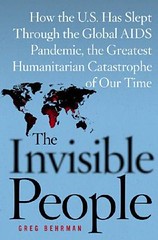 “A century from now, when historians write about our era, one question will dwarf all others, and it won’t be about finance or politics or even terrorism. The question will be, simply, how could our rich and civilised society allow a known and beatable enemy to kill millions of people.†This is the question Greg Behrman seeks to highlight in his compelling and incisive book The Invisible People
“A century from now, when historians write about our era, one question will dwarf all others, and it won’t be about finance or politics or even terrorism. The question will be, simply, how could our rich and civilised society allow a known and beatable enemy to kill millions of people.†This is the question Greg Behrman seeks to highlight in his compelling and incisive book The Invisible People: How the US has slept through the Global AIDS pandemic, the greatest humanitarian catastrophe of our time.
As you can tell from the title, Behrman does not pull any punches. Cutting back and forth through time as we follow key characters in the struggle against the burgeoning pandemic, Behrman shows how time and time again chances were missed to do something constructive about the catastrophe that is Global AIDS. Reagan’s conservative distaste for ‘the gay plague’, Clinton’s empathy but almost total inaction, and the bureaucratic infighting that repeatedly stymied attempts to do something, anything. As each chance was missed, millions more were infected, millions more were orphaned and millions more died.
I’d always known about AIDS in an abstract sense, known that there were high infection rates in Africa (where my father was born), but it had never truly hit home until I read this book. I have spent my life living through a holocaust and have for the large part ignored it. I can’t do that anymore. I’ve talked to Ben and we are going to try and find some way to raise funds and awareness for the Global AIDS movement when we go for SOUTH. Our expeditions give us a voice and it is time we used it.
For all those who think that AIDS is under control, imagine this. Imagine your child being born already infected with a death sentence. Imagine every third person you see being infected with HIV. Imagine 5-6 million people dying of AIDS in the next two years. Imagine, in fact, that you live in Sub-Saharan Africa. One day our children will ask us what we did about the Holocaust in Africa, let’s hope we have an answer.